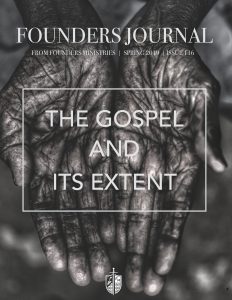Chapter 20 Expanded
I transcribe the text of the chapter with additions. My suggested additions are in italics. Each paragraph is followed with a bracketed section referring to places in the confession that warrant the added text. Also, I have added proof texts that support the textual additions.
- The covenant of works being broken by sin, and made unprofitable unto life, God was pleased to give forth the promise of Christ, the seed of the woman, as the means of calling the elect, and begetting in them faith and repentance; in this promise the gospel, as to the substance of it, was revealed, and [is] therein effectual for the conversion and salvation of sinners. [Gen. 3:15; Re. 13:8] This promise of grace assumes the creation truth that mankind is a moral creature thus capable of affection for God and volitional doxology toward God. God’s purpose, therefore, of restoring an elect people to His favor through Christ and reinstating Himself as the sole source and object of their praise and worship does not exclude any of fallen humanity from the duty to pursue the ends of the Gospel [Ephesians 1:9-12; Phil. 1:9-11; 1 Timothy 1:8-11, 15-17.]
[Compare Chapter 4, paragraph 2 entire but particularly “rendering them fit unto that life to God for which they were created.” Also, Compare chapter 7, paragraph 2 which states “Moreover, man having brought himself under the curse of the law by his fall, it pleased the Lord to make a covenant of grace, wherein he freely offereth unto sinners life and salvation by Jesus Christ, requiring of them faith in him, that they may be saved; and promising to give unto all those that are ordained unto eternal life, his Holy Spirit, to make them willing and able to believe”]
- This promise of Christ, and salvation by Him, is revealed only by the Word of God; neither do the works of creation or providence, with the light of nature, make discovery of Christ, or of grace by him, so much as in a general or obscure way; much less that men destitute of the revelation of Him by the promise or gospel, should be enabled thereby to attain saving faith or repentance. [Rom. 1:16; 10:14-17; Prov. 29:18; Isa. 25:7; 60:2, 3] God provides, therefore, by command and providence, that proclamation of the full counsel of God be made to all men as sinners.The law initially written on the heart, as well as the moral law revealed to Israel, fully complies with the grace of the Gospel. This reality most forcefully implies that Christ’s Gospel be proclaimed to all fallen humanity. The decree of salvation for the elect of every tongue, tribe, nation, involves of necessity the proclamation of both the Gospel and the accompanying duties of repentance from sin and faith in the Lord Jesus to all men everywhere with the general promise that all who so believe will certainly be saved [Revelation 5:12-14; 7; Acts 17:24-31; Romans 10:12, 13]
[Compare chapter 2, paragraph 2 “to him is due from angels and men, whatsoever worship, or obedience, as creatures they owe unto the Creator, and whatever he is further pleased to require of them.” also compare chapter 5, paragraph 6, “whereby it comes to pass that they harden themselves, under those means which God useth for the softening of others.” Also compare chapter 19, paragraph 2, “The same law that was first written in the heart of man continued to be a perfect rule of righteousness after the fall, and was delivered by God upon Mount Sinai, etc.” paragraph 5, “The moral law doth for ever bind all, as well justified persons as others . . . neither doth Christ in the Gospel any way dissolve, but much strengthen this obligation.” And paragraph 7 “Neither are the aforementioned uses of the law contrary to the grace of the Gospel, but do sweetly comply with it, the Spirit of Christ subduing and enabling the will of man to do that freely and cheerfully which the will of God, revealed in the law, requireth to be done.”
- The revelation of the Gospel unto sinners, made in divers times and by sundry parts, with the addition of promises and precepts for the obedience required therein, as to the nations and persons to whom it is granted, is merely of the sovereign will and good pleasure of God; not being annexed by virtue of any promise to the due improvement of men’s natural abilities, by virtue of common light received without it, which none ever did make, or can do so; and therefore in all ages, the preaching of the gospel has been granted unto persons and nations, as to the extensionor limitingof it, in great variety, according to the counsel of the will of God. His secret will and good pleasure in this wise providence, however, is not the rule of our action; but rather his church must be governed by his commission of the gospel to all nations as the means of their calling and the consequent apostolic action of evangelization of both the circumcision and the uncircumcision. The apostolic work of careful dissemination, defense, and confirmation of the Gospel among all nations bore fruit only by virtue of the sovereign, inscrutable, and insuperable work of the Spirit embedding the preached word with vital power, and at the same time manifested the apostolic understanding of his command to make disciples. [Acts 13:48; Phil. 1:6; Col. 1:3-6; 1 Thes. 1:4-7; 2 Thes. 2:13-15; 2 Tim. 2:8-10; James 1:17, 18; 1 Peter 1:22-25]
Elements of this original article give direct refutation to the Arminian contention that fallen humanity by virtue of universal prevenient grace may respond positively to natural revelation and thus gain God’s favor for a further hearing of the gospel or even perhaps having their natural religion account to them as virtual faith in Christ, though they never have heard the gospel. {See chapter 10, paragraph 4 on this account also.} Thomas Grantham, a general Baptist, specifically taught this and taught that apart from such prevenient grace, sinners could not be held responsible for their refusal to comply with the implications of natural revelation or of the preached gospel. Compare chapter 3, paragraph 1 – “nor yet is the liberty or contingency of second causes taken away.” Paragraph 6. ‘foreordained all the means thereunto.” Chapter 5, paragraph 2 “yet by the same providence he ordereth them to fall out according to the nature of second causes, either, necessarily, freely, or contingently.” Chapter 10, paragraph 1 – “by his word and Spirit . . . enlightening their minds spiritually and savingly to understand the things of God;” paragraph 4 “Much less can men that receive not the Christian religion be saved.” Also chapter 14, paragraph 1, “The grace of faith . . . is ordinarily wrought by the ministry of the Word.”
- We, therefore, affirm and have joyful confidence in these indivisible truths: the gospel isthe only means of revealing Christ and saving grace, and is, as such abundantly sufficient thereunto; yet that men who are dead in trespasses may be born again, quickened or regenerated, [omit semi-colon and insert comma]there is moreover necessary, beyond the mere persuasive power of bare truth, an effectual insuperable work of the Holy Spirit upon the whole soul, for the producing in them a new spiritual life; without which no other means will effect their conversion unto God. [Ps. 110:3; 1 Cor. 2:14; Eph. 1:19, 20; John 6:44; 2 Cor. 4, 4, 6]
Compare also chapter X on effectual calling paragraph 1: “enlightening [sic] their minds, spiritually and savingly to understand the things of God;” also paragraph 4; “although they may be called by the Ministry of the word, and may have some common operations of the Spirit, yet not being effectually drawn by the Father, they neither will nor can truly come to Christ”





















